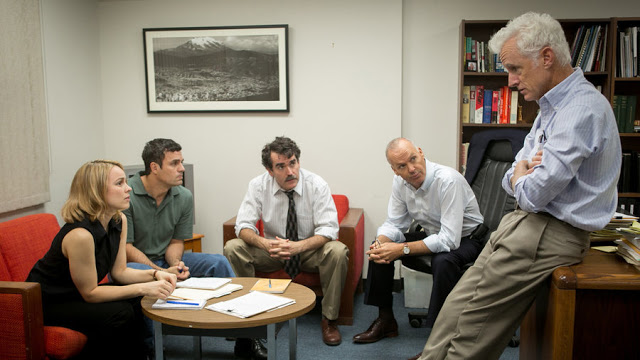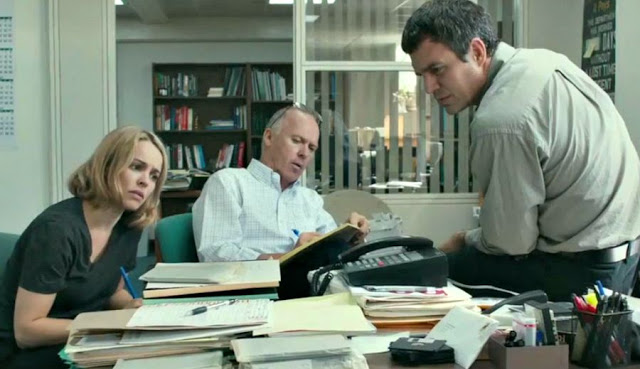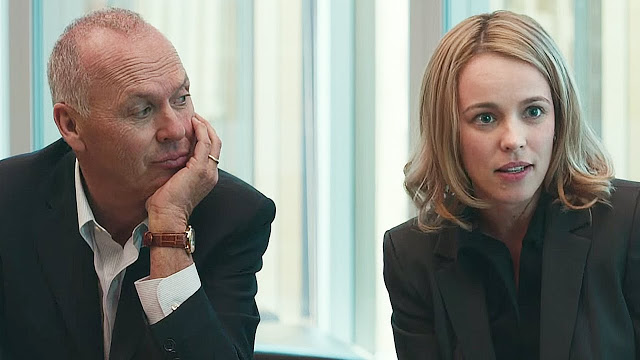Spotlight, Tom McCarthy’s meticulous and provocative reconstruction of the Boston Globe‘s exposé of systemic abuse within the Catholic Church, is an investigative drama about a newspaper. This essentially marks it as a double dinosaur. The journalism industry may not be extinct, but it is changing so rapidly—an ever-morphing mélange of instant reactions, hot takes, and online clickbait—that it scarcely resembles the model of old, when ravenous readers folded oversized pages and inked their hands with newsprint. And Spotlight itself, with its sprawling cast and its long, talky passages, is something of a throwback, an ode to the muckraking magnificence of All the President’s Men. Yet it would be a mistake to perceive this fleet, largely exhilarating film as a mere exercise in halcyon-tinged nostalgia. It is too persuasive, too urgent, to function simply as tribute. Spotlight may dredge up horrors of the past, but its ethos—a near-primal insistence on the eternal value of hard work and nose-to-the-grindstone reporting—renders it thoroughly present.
Following an unnecessary cold open set in the late ’70s, the movie begins in July 2001, at the drab, messily adorned offices of the Globe. The title refers to the paper’s four-person investigative team, spearheaded by editor Walter “Robby” Robinson (Michael Keaton), and staffed by reporters Mike Rezendes (Mark Ruffalo), Sacha Pfeiffer (Rachel McAdams), and Matt Carroll (Brian d’Arcy James). It operates as a quasi-independent pod, supplementing the Globe‘s daily coverage with longer, more exhaustive pieces. The stories are designed to be hard-hitting, but they also require months of scrupulous research, and when Robby explains the process to his new superior, incoming editor Marty Baron (Liev Schreiber), he is met with a raised eyebrow. Periodicals need to report the news, but they also need to make money, and a question hangs in the air about the sustainability of this old-fashioned, low-output research squad.
But Spotlight is only glancingly about the tribulations of print media in the digital age. This isn’t a generalized think-piece; it’s a highly specific account of a particularly appalling scandal. And McCarthy’s screenplay, which he wrote with Josh Singer (a former staff writer for The West Wing), quickly heats up once Baron notices a recent clipping—a buried item about a priest accused of child abuse—and questions whether there might be more to the story. Lucky for him, the Globe just happens to employ a team whose entire job is to investigate institutional corruption. When informed by fellow editor Ben Bradlee Jr. (John Slattery, playing the son of the former Washington Post editor, whom Jason Robards portrayed in his Oscar-winning performance in All the President’s Men) that Spotlight typically picks its own projects, Baron responds, with just the slightest trace of authoritarianism, “Would you consider picking this one?”
From here, Spotlight charges forward with a momentum that is both haphazard and intensely focused. The investigation begins with a simple interview of a Church “survivor” (Neal Huff), whose tale of trauma is plenty upsetting in its own right. But the more the team digs, the more alarming information it uncovers, and the more expansive its scope becomes. We meet a number of lawyers, including a fiery plaintiffs’ attorney (Stanley Tucci), an unctuous shark (Billy Crudup), and a wary outside counselor (Jamey Sheridan) who happens to be close friends with Robby. We also meet other victims, rival journalists, judges and clerks, numerous priests, and one terrifyingly polite Cardinal (Len Cariou). That’s quite a lot of people to be interviewed and confronted, but while the movie contains a daunting amount of information, it streamlines its data into a coherent and digestible package without cutting any corners. Every scene in Spotlight feels crucial, an indispensable brick that builds to the team’s ultimate revelation: that the Catholic Church has for decades in Boston perpetuated a system of child abuse, concealment, and corruption.
This is, in crude journalistic terms, a bombshell, and McCarthy shows it the proper reverence without artificially inflating its significance. That’s why the film’s most gripping scene involves the Spotlight team huddled around a speakerphone. The man they’re chatting with, Richard Sipe (an uncredited Richard Jenkins, who headlined McCarthy’s The Visitor), is an academic who has turned his research of the Church into his life’s work. Robby and his reporters gently probe Sipe, wondering if it’s remotely possible, as their research has suggested, that up to thirteen different Boston priests could have molested children. Sipe is dubious. No, he says, the real number is likely closer to ninety. The team is dumbfounded, but the movie doesn’t flinch. Over the course of this conversation, the camera gradually pulls back, never once cutting, making the journalists look smaller as the sheer weight of this discovery crashes down upon them.
That is as close as McCarthy comes to a visual flourish. He isn’t the most dazzling director, and Spotlight, with its dull interiors and bland palette, is a bit visually frumpy. But that’s in keeping with the movie’s overarching sensibility of rugged persistence. Above all, Spotlight is a powerful paean to a thoroughly unglamorous concept: that of committed people doing hard work. As with All the President’s Men, it matters little that we know how this story ends; what matters is the process, and the film seethes with verisimilitude. (One exception: It strains credulity that the employees of a Beantown newsroom would uniformly refrain from using profanity; this was presumably a concession to appease the MPAA, which rated the movie “R” anyway—its official justification was “some language including sexual references”—branding Spotlight as yet another casualty of that organization’s arbitrary tyranny.) Scene after scene involves the reporters doing little more than running down facts—on the phone, in the library, knocking on doors. It’s hardly sexy, but it is strangely thrilling to watch these professionals devote themselves so deeply to their craft, to root alongside them as they ferret out sources and sift through reams of paper. The newspaper industry may be verging on obsolescence—in a wry visual quip, the Globe‘s parking lot hosts a towering billboard for AOL—but Spotlight makes a compelling case for the continued vitality of the fourth estate. (In a way, this makes the movie a companion piece to the fifth season of The Wire, in which McCarthy played an amoral reporter who manufactured stories to boost his own fame.)
Again, however, the film is not simply a valentine. There is an undercurrent of rage to its painstaking factualism, a sense of dismay that an institution as venerable as the Catholic Church could have countenanced and cultivated such evil. Yet for the most part, Spotlight modulates its fury and disbelief, expressing it primarily through the reporters’ work. (In the film’s most upsetting scene, McAdams’s Sacha interviews a priest who unrepentantly confesses to molestation, then justifies it by emphasizing that he received no pleasure himself.) The movie’s anger is given loudest voice by Ruffalo as Rezendes, a lapsed Catholic who is incensed by the Church’s complicity and duplicity; his roars could have felt histrionic, but Ruffalo roots them in honesty. But while the entire cast is very good—Slattery’s delightful deadpan is a welcome tonic in such a grim tale, while Crudup deftly adds layers to his character in just a handful of scenes—the anchors are Schreiber and Keaton. A Jew who dislikes baseball, Baron is an obvious outsider in a city dominated by Red Sox-obsessed Christians, and Schreiber delicately articulates his isolation while also demonstrating his unshakable resolve. And Keaton portrays Robby as a wounded warrior, an entrenched veteran who must reconcile his own position within Boston’s elite with his mandate to expose the truth.
It’s no secret where he comes down, and Robby’s incorruptibility raises questions about Spotlight as a whole. The movie is remarkably persuasive in its storytelling, but it could also be perceived as a homily, a hagiographic telling of the Globe‘s righteousness. That isn’t quite fair—Spotlight is too finely textured to be thuddingly blunt—but the film does cast aspersions on a number of parties, some of whose culpability lies in a grey area. Whenever a source (typically a lawyer) insists that he was simply doing his job in maintaining confidentiality rather than disclosing the abuse to the press, Robby and his team tend to respond with Nuremberg-flavored derision. It’s a reasonable reaction, given the horrors that they’ve discovered, but it also lacks the shading that McCarthy brings to most of the investigative passages.
But that is a quibble, and a philosophical one at that. Spotlight isn’t about right and wrong, or good and evil. It’s about perseverance, about ringing phones, long nights, warm beer, and cold pizza. The movie tells of a heroic triumph of investigative journalism, but it never suggests that its characters’ labor is at an end. That may be why the film feels so rewarding, even as it traffics in subject matter that is unspeakably ugly. Society will always be afflicted with corruption and sin. But Spotlight reminds us that it also features reporters just doing their jobs: answering phones, gathering sources, chasing quotes, and shining a light into the darkness.
Jeremy Beck is the editor-in-chief of MovieManifesto. He watches more movies and television than he probably should.



